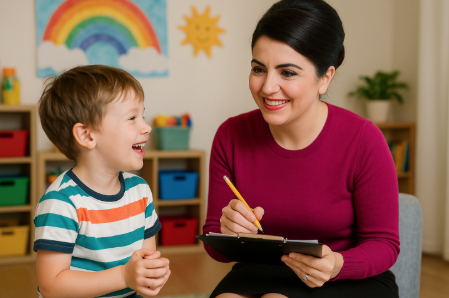Attention Deficit Hyperactivity Disorder (ADHD) is one of the most commonly diagnosed neurodevelopmental conditions in children, yet it is often misunderstood. Many parents find themselves asking, “Is this normal behaviour, or could it be ADHD?” If you’ve ever wondered whether your child’s high energy, distractibility, or emotional intensity could be something more, you’re not alone.
At Brave Little Heroes Psychology Hub in Melbourne, we work closely with families to identify and support children who may be experiencing challenges related to ADHD. Early understanding and intervention can make a world of difference—not only in your child’s development but also in the wellbeing of the whole family.
What Is ADHD?
ADHD affects a child’s ability to focus, regulate their emotions, and manage impulses. While all children can be distracted, impulsive or energetic at times, children with ADHD often struggle with these behaviours consistently and across multiple settings—such as home, school, and social situations.
There are three primary types of ADHD:
Inattentive type – where focus, organisation, and memory are major difficulties
Hyperactive-impulsive type – where restlessness and impulsivity are most prominent
Combined type – where both sets of traits are present
Recognising the signs early allows parents and educators to implement the right strategies and support systems that can help the child thrive.
Common Signs to Watch For
Every child is different, but some of the common signs of ADHD in children may include:
Difficulty paying attention or following instructions
Frequently losing items like books, toys, or school supplies
Struggling to sit still during quiet time or meals
Talking excessively or interrupting others
Trouble waiting their turn in games or conversations
Impulsive behaviour, like blurting out answers or acting without thinking
Intense emotional reactions or mood swings
These behaviours can affect a child’s self-esteem, academic performance, and relationships with peers. Left unsupported, children may become frustrated or misunderstood—leading to bigger emotional or behavioural challenges down the track.
When Should You Seek Help?
If you’re noticing consistent patterns of inattention, hyperactivity, or impulsivity that interfere with your child’s daily life, it may be time to speak with a professional. An experienced child psychologist can help assess whether ADHD is a factor and guide your family toward a plan that supports your child’s strengths.
Getting help doesn’t mean labelling or limiting your child—it’s about understanding them better and giving them the tools they need to succeed.
How Rena Kouppa Can Help
At Brave Little Heroes, Rena Kouppa brings years of experience and a deep, compassionate understanding of child development. Her work with children with ADHD focuses on practical, strengths-based approaches that build confidence, improve attention and support emotional regulation.
Rena also works closely with parents and educators, helping them respond to behaviours in ways that are positive and constructive. Every child’s brain is different, and Rena tailors her approach to each family’s specific needs—ensuring that strategies are meaningful, realistic, and sustainable.
To learn more about how she can support your child, visit our ADHD psychologist Melbourne service page.
A Positive Future Begins with Understanding
Understanding ADHD is the first step in helping your child thrive. With the right support, children with ADHD can become creative problem-solvers, curious learners, and confident individuals. They just need the right environment to grow.
If you suspect your child might be struggling with attention or hyperactivity, don’t wait for the school to raise concerns. Reach out today to Brave Little Heroes Psychology Hub in Melbourne and discover how early intervention can shape a brighter future—for both your child and your family.
 :
https://bravelittleheroespsychologyhub.com.au/
:
https://bravelittleheroespsychologyhub.com.au/

